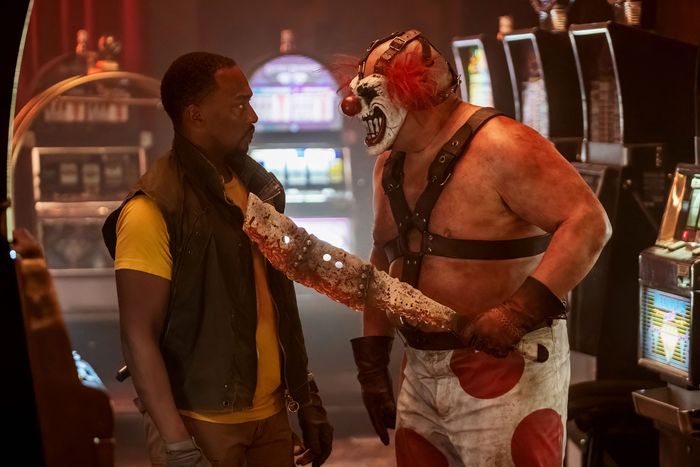
There’s a character in Twisted Metal called Sweet Tooth. He is brawny and wide, with tight pants and a leather harness on his shoulders and a gruesome grinning clown mask on his face. His mind exists somewhere outside of reality, only occasionally connecting the dots between his inner fantasies and the rest of the world. He is violent and sarcastic and obsessed with attention. He has the voice of Will Arnett, even though his body is that of wrestler Samoa Joe. He’s sort of the Joker and sort of 20 other comic-book villains, a mishmash of stuff that exists together because it imagines itself to be fun and weird. And Sweet Tooth is empty, ungrounded in emotional sincerity, narrative coherence, or the themes of any broader story he is meant to be a part of. He is a middle-school doodle on a piece of paper.
Sweet Tooth is a good place to start with Twisted Metal because despite his fairly minor role in the new Peacock series — he’s not even the Big Bad, although he’s a significant character in the source work — he does feel representative of what this adaptation of the car-combat video-game series wants to be. Its general mode of operating is to put in whatever seems cool and fun and silly and sick and leave out anything that does not meet those parameters. Yes to: guns, cars, sardonic needle drops, wisecracks, blood, sex, flash, grime, the sound of tires on pavement, shit that looks dope. No to: quietness, finicky world-building, thinking too hard about the limitations of the human body, complex motivations, depth, taking stuff too seriously, man.
None of this feels like a bad bet when surveying the cultural landscape. There’s plenty here for fans of The Umbrella Academy and Deadpool (the latter a previous project from Twisted Metal’s executive producers), both inarguably successful franchises that also invest a great deal in voice-y, sarcastic storytelling and violent fight scenes set to wryly chipper pop music. (Twisted Metal bravely combines car explosions and “MMMBop.”) But that plug-and-play aesthetic priority is all of what Twisted Metal offers. It looks and sounds and feels like other things people like. Does it need to have more than that? By the end of the season’s ten episodes, Sweet Tooth’s head gets set on fire and he’s improbably able to carry on with a shocking amount of vehicular mayhem while flames continue to leap from his skull, so maybe not. But that doesn’t make it good television.
If Anthony Mackie were less good as the lead, John Doe (there’s that smart-ass streak popping up again), Twisted Metal would be excruciating. A guy who can’t remember his past and now spends his time as a “Milk Man,” driving across a post-apocalyptic America making deliveries between walled city-states, John’s charming and he’s tortured and his only real relationship is with his car, a tricked-out orange Subaru named Eveline. Except then, wouldn’t you know it, he gets tangled up with a nameless woman of few words whom he eventually nicknames Quiet (Stephanie Beatriz), and now it’s a buddy road comedy.
This side of Twisted Metal does have its moments. Within the sketchy definitions of their respective characters, Beatriz and Mackie can bounce off of each other and paper over some of the blank spaces of who these people are and what they want: He just wants to retire in peace, she’s driven by revenge, and somehow they find middle ground in discussions of mix CDs and goals for the future. Mackie in particular can hoist some of the sillier dialogue across the finish line with the sheer power of enthusiasm, and it’s hard to imagine anyone else would be more successful at seriously intoning that he’s the Milk Man and He’s Got a Deadline to Meet.
For the most part, though, those exchanges between John and Quiet are just extra bits of leavening between already airy car-crash sequences. The emotional arc of their relationship is the sole piece of meaningful narrative development over the season, but it’s not enough to make Twisted Metal into anything more fun or substantive than smashing a Hot Wheels with a hammer. Which is a pursuit with its own form of pleasure, to be fair: Sometimes you just want to watch the little plastic tires fly off and see how much of a divot you can make in your parents’ patio pavers. But also like Twisted Metal, it’s the kind of activity that becomes repetitive very quickly, especially once it’s clear that destruction is the only destination.


